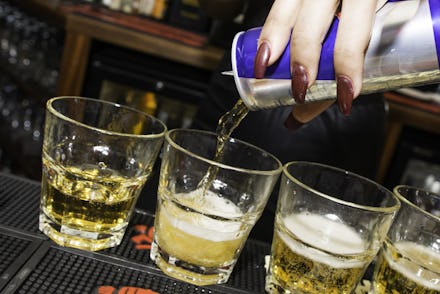The Red Bull and Vodka effect: What mixing caffeine and alcohol does to your body

Given that spiked seltzer and cold brew reign among the buzziest canned beverages right now, the emergence of hard cold brew seems only inevitable. La Colombe recently teamed up with MillerCoors to develop a 4.2% ABV Hard Cold Brew Coffee, while Cafe Agave has released an even boozier, 12.5% ABV Spiked Cold Brew line. Hipster favorite PBR has announced a hard coffee, as well — one that I can only imagine as a wild dive bar night in a can. Is mixing caffeine and alcohol a terrible idea, though?
All of this probably feels like déjà vu if you’re an older millennial, in which case you may recall Four Loko, the alcoholic energy drink linked to hospitalizations and even deaths, especially among college students; in 2010, the Food and Drug Administration ordered Phusion Projects, LLC, manufacturer of Four Loko, and similar companies to remove caffeine from their drinks or risk seizure of their products. Hard cold brews may seem hipper and more refined than these erstwhile frat house staples, but doctors warn that they’re still dangerous. Ultimately, what you're doing in all of these cases is mixing and "upper" with a "downer."
Alcohol depresses your nervous system, but caffeine stimulates it, making you feel more alert and allowing you to bypass the lethargy and other responses your body naturally has to booze.
“I would never recommend mixing caffeine or alcohol,” Alexa Mieses, a family physician and an assistant professor in the department of family medicine at UNC-Chapel Hill, tells Mic. “Just because a product is new doesn’t mean it’s safer.”
Alcohol depresses your nervous system, but caffeine stimulates it, making you feel more alert and allowing you to bypass the lethargy and other responses your body naturally has to alcohol, Mieses explains. In other words, the caffeine makes you feel less drunk — even when that's not the case, since caffeine doesn’t change the way your body metabolizes alcohol. Normally, you’d gauge how much more alcohol your body can handle based on how drunk you feel, but “now that feeling is dampened, and you’re increasing the risk of binge drinking,” Mieses says.
Binge drinking, in turn, could also lead to alcohol poisoning — a serious, potentially fatal, result of drinking a lot of alcohol in a narrow window of time — whose symptoms can include hypothermia, slow breathing, and vomiting, according to the Mayo Clinic. Alcohol poisoning can also result in complications, such as extreme dehydration, and accidentally inhaling and suffocating on your own vomit.
And again, since caffeine doesn’t change how drunk you are, consuming it with alcohol will still result in lowered inhibitions and impaired judgment, making you more likely to engage in risky behaviors, such as unprotected sex and drunk driving. Caffeine may make you confident enough to drive when you’d otherwise feel way too drunk to get behind the wheel, Mieses says. She adds that caffeine can stave off the feeling of being drunk, but eventually it might hit you all at once as the caffeine wears off, which can feel scary and, again, put you at risk.
Mieses adds that classic caffeinated cocktails, like espresso martinis and vodka Red Bulls, pose the same dangers. Double-fisting with caffeine to make your night last is also a bad idea, says Angela Sparks, a family physician at Kaiser Permanente in Washington state. Basically, when you combine caffeine with alcohol, “all the risks of binge drinking are higher because there’s more alcohol on board."
Best-case scenario if you add caffeine to the mix, you’ll just end up with a godawful hangover, and worst-case scenario, you’ll land in the ER, get alcohol poisoning, get a DUI, and/or harm someone else, Sparks says. Caffeine and alcohol may seem like the ultimate power duo, but it isn’t worth the slew of risks.